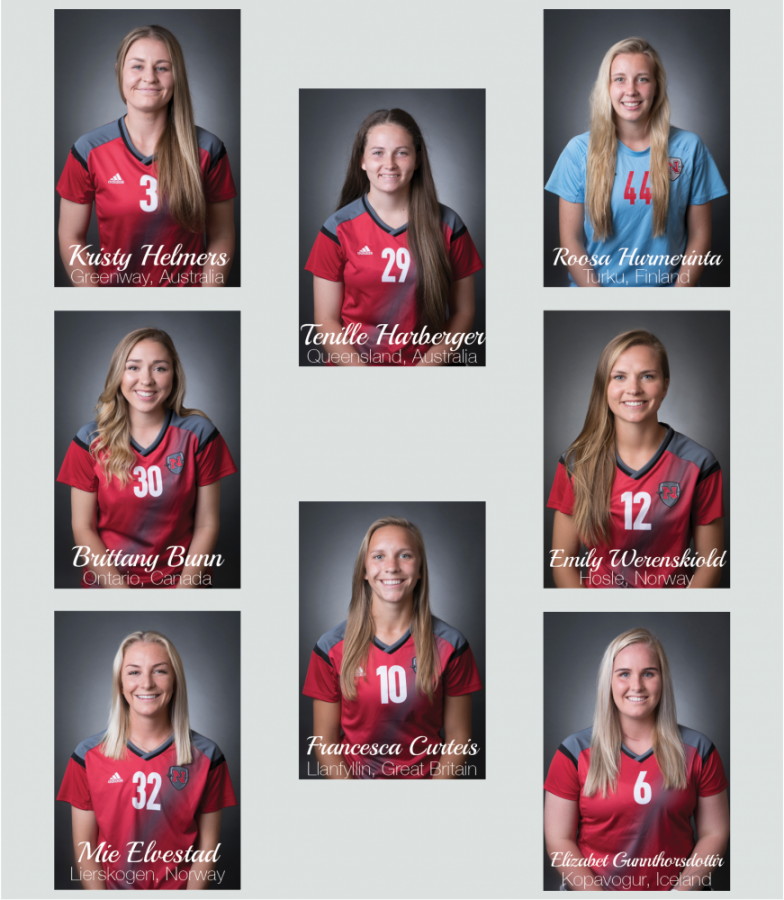Feature: International soccer stars
October 10, 2017
Photo by: Rachel Klaus and Jessica Mouton
With the 2018 World Cup swiftly approaching, countries around the world will begin to turn their attention toward their respective national teams. These teams will hope to make their country proud through tough play, sportsmanship and ultimately, a World Cup title. While the World Cup gives teams the platform to show their skills, it also gives them a chance to display the history and culture of the country they represent.
Viewers in the United States will get to see how important the sport is to countries such as Chile or Argentina. For these people, soccer is not just a recreational activity, but a lifestyle. When college coaches recruit foreign players to their team, they are using these players’ love for soccer to their advantage. The Nicholls State University soccer team follows this strategy, as the roster is made up of several foreign players that each bring unique qualities to the team.
When these foreign players are recruited to universities, a recruitment agency is often used as a median between college coaches and the coaches of the foreign players’ team. Another method of recruitment is through direct contact with the coaches of the professional clubs of the players.
“We’re already a long way down the line with a number of players from overseas. We’re going directly through the professional clubs. I’ve got quite a few contacts in different countries and we’re going to look to use those contacts in the coming few years,” said Head Coach of Nicholls Soccer Mac McBride, who is from Birmingham, England, regarding the recruitment process.
The Nicholls State University soccer team currently has eight foreign players on the roster. The players come from places ranging from Canada to Australia. With such a diverse group of foreign players, the Nicholls team is given the chance to not only learn new fundamental soccer skills, but also learn about new cultures and what makes them unique.
“I think recruiting these players has reached the team culturally, really. We’ve got a real mix and I like that,” Coach McBride said. “They say travel broadens the mind, but if you don’t have the opportunity to travel to another country, the next best thing is to meet someone from that country and talk about things. So the world’s coming to us in a way. I do think the international players give a slightly different view on things. There’s a lot of shared experiences and we benefit from it, it’s a good thing.”
Different technical playing styles from overseas can be incorporated with the physical American playing style to make it more refined, sophomore forward Kristy Helmers, who hails from Greenway, Australia, said,
“Coming from a different playing style, we bring something different to the team. They obviously can teach and show us a lot, but we can also bring something that the team or someone we played has never seen before.”
These foreign players make a tough decision when they decide to leave home to play soccer in the United States. The decision ultimately comes down to being able to play soccer and go to school at the same time. In some foreign countries, players are not able to do both at the same place. Coming to a new country, the players faced obvious changes, such as language, culture and weather in some cases.
“The toughest part for me was the language. I can remember my first couple of weeks, I didn’t talk to anyone. I had to sit and record the class and listen back to it after. It was hard,” said senior midfielder Emily Werenskiold, who came from Hosle, Norway.
“I’m a shy girl, so it took me a while especially with the new language. I mean, I could speak English but I never used it. Being so far away from your family was tough, but Skyping them helped,” explained goalkeeper Roosa Hurmerinta, a sophomore from Turku, Finland.
Many foreign countries hold soccer to the same regard as Americans do football or basketball. Coach McBride said that people in England play pickup soccer games similarly to how Americans play pickup basketball games. Players in these countries learn how to play at an early age, and hone their craft daily by practicing even when they may not have the ideal conditions to. Players like Lionel Messi, arguably the best soccer player on the world, grew up playing soccer in the streets of Argentina.
“In some parts of the world, everything stops when there’s soccer. So, that’s the biggest difference between the United States and the rest of the world,” said Coach McBride.
